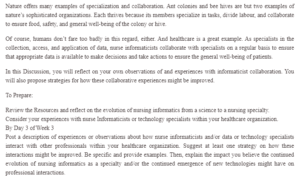Interactions Between Nurse Informaticists and Other Specialists
Every day, informatics alternates the delivery of patient care. Healthcare companies and experts will be able to obtain and evaluate data more efficiently as technology advances. Consolidating informatics with evidence-based practice can aid in the advantage of providing high-quality treatment to patients. When analyzing massive volumes of data, methods can be identified that have the potential to improve any process. While integrating technology into knowledge may help in identifying potential concerns sooner, it should not replace the nurse’s ability to interact with patients (McGonigle & Mastrian, 2017). The nurse informaticists and IT team at the home care organization where I presently work provide a lot of value.
MUMMS is the primary program for palliative and hospice patients’ electronic medical records, and it is used by all medical directors and professionals (EMRs). The nurse informaticist’s key responsibilities include training new employees on how to use the MUMMS software, providing refresher courses for staff during competency reviews, and updating staff when a new tab in MUMMS is created. A patient was just discharged from the hospital with prescriptions on their list that were out of date and were intended to be terminated but were still present when they were admitted to their home. The nurse informaticist updated the team about a new tab created for the medication profile reconciliation system to resolve the medication error issue.
To avoid medication errors, the nurse informaticist emphasized that two nurses must verify the patient’s medication discharge list from the hospital to their home during an admission. The home care organization provides a 24-hour IT hotline that can be reached after hours if the nurse informaticist is unavailable. Medication errors connected with hospital discharge can become a problem, resulting in re-admissions and ER visits. Implementing and involving pharmacists with MUMMS software during post-discharge transitions is one way of reducing medication mistakes.
The present pharmacist works with Enclara Pharmacia software, which is not currently linked to MUMMS. According to Graabæk et al. (2019), a pharmacist-driven intervention should focus on patient education and medication reconciliation after discharge to improve drug consumption and reduce healthcare costs, resources, and re-hospitalizations. The influence of technological advancements in hardware and software acknowledges the need to provide up-to-date and correct information to all healthcare practitioners to improve patient care. Important information can help to avoid prescription errors and mistakes, such as providing discontinued medications before they expire.
Reference
Graabæk, T., Terkildsen, B. G., Lauritsen, K. E., & Almarsdóttir, A. B. (2019). Frequency of undocumented medication discrepancies in discharge letters after hospitalization of older patients: a clinical record review study. Therapeutic advances in drug safety, 10, 2042098619858049. https://doi.org/10.1177/2042098619858049
McGonigle, D., & Mastrian, K. G. (2017). Nursing informatics and the foundation of knowledge (4th ed.). Burlington, MA: Jones & Bartlett Learning.
ORDER A PLAGIARISM-FREE PAPER HERE
We’ll write everything from scratch
Question
Nature offers many examples of specialization and collaboration. Ant colonies and bee hives are but two examples of nature’s sophisticated organizations. Each thrives because its members specialize in tasks, divide labour, and collaborate to ensure food, safety, and general well-being of the colony or hive.

Interactions Between Nurse Informaticists and Other Specialists
Of course, humans don’t fare too badly in this regard, either. And healthcare is a great example. As specialists in the collection, access, and application of data, nurse informaticists collaborate with specialists on a regular basis to ensure that appropriate data is available to make decisions and take actions to ensure the general well-being of patients.
In this Discussion, you will reflect on your own observations of and experiences with informaticist collaboration. You will also propose strategies for how these collaborative experiences might be improved.
To Prepare:
Review the Resources and reflect on the evolution of nursing informatics from a science to a nursing specialty.
Consider your experiences with nurse Informaticists or technology specialists within your healthcare organization.
By Day 3 of Week 3
Post a description of experiences or observations about how nurse informaticists and/or data or technology specialists interact with other professionals within your healthcare organization. Suggest at least one strategy on how these interactions might be improved. Be specific and provide examples. Then, explain the impact you believe the continued evolution of nursing informatics as a specialty and/or the continued emergence of new technologies might have on professional interactions.

